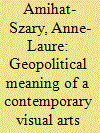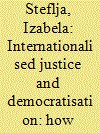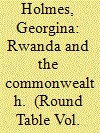|
|
|
Sort Order |
|
|
|
Items / Page
|
|
|
|
|
|
|
| Srl | Item |
| 1 |
ID:
108607


|
|
|
|
|
| Publication |
2011.
|
| Summary/Abstract |
Against the background of conflict in the Great Lakes Region, the UK and France promised, at their 1998 Saint-Malo summit, to set aside rivalries and cooperate on Africa. In subsequent Anglo-French gatherings, they singled out the DRC and pledged to work together there to promote peace and tackle poverty. This article asks whether this coordination took place and whether it involved a 'deconflictualisation' of approaches, 'coincidental' cooperation, or 'sustained and reciprocal' collaboration. It looks for evidence of institutionalisation of UK-French ties and policy cooperation in the fields of peacebuilding and poverty reduction. It then identifies the pressures for, and barriers to, collaboration, focusing particularly on the role of interests, foreign policy norms, institutional factors and resource constraints. It concludes by setting out the wider implications of UK-French cooperation and the limited prospects of closer future collaboration.
|
|
|
|
|
|
|
|
|
|
|
|
|
|
|
|
| 2 |
ID:
121232


|
|
|
|
|
| Publication |
2012.
|
| Summary/Abstract |
WHY SEEK A VISUAL UNDERSTANDING OF BORDERS?
Their common border can be seen as a synecdoche of the complex relations
between Canada and the United States: not only is it the longest border in the
world (at 8,891 kilometres-5,061 kilometres on land and 3,830 kilometres
at sea), but it also represents a line where strong and soft politics and
geopolitics converge. One can say that the border not only divides the two
states but reflects their relations. Until recently, the border was considered
one of the most "benign" the world-an exceptional label, considering the border's length.1
For over two centuries, political divisions between the two
countries, inherited in part from a colonial divide in the east but also from the
outcome of frontier competition in the west, did not represent an obstacle to
everyday life in the border regions. In fact, various economic activities have
benefitted from houses built on the line in order to evade taxation, to the
more complex industrial systems, such as that of the automobile industry
in the Great Lakes region. These activities have led to the consolidation of a
number of cross-border regions, enhanced by NAFTA, which are witnesses
to both the vitality and variety of interactions along the line.2
|
|
|
|
|
|
|
|
|
|
|
|
|
|
|
|
| 3 |
ID:
163062


|
|
|
|
|
| Summary/Abstract |
This article examines the relationship between international criminal justice and democratisation processes in post-conflict settings, illustrating that international tribunals did not contribute to democratisation in the cases of Serbia, Kosovo and Rwanda. The argument that tribunals have willingly or inadvertently empowered local non-reformist factions is rooted in the agency of local elites. The findings suggest prioritisation of international over localised knowledge, political over victim interests and stability over judicial independence. This article makes a contribution to the emerging, critical literature on the dynamics between institutions of international criminal law and their socio-political environments, drawing attention to volatile effects of internationalised justice.
|
|
|
|
|
|
|
|
|
|
|
|
|
|
|
|
| 4 |
ID:
122187


|
|
|
|
|
| Publication |
2012.
|
| Summary/Abstract |
Dominant narratives of war in the Democratic Republic of the Congo and the Great
Lakes region have emphasised the use of mass rape as a weapon of war that is primarily used against women. Georgina Holmes argues the need to go beyond this reductionist interpretation: mass rape is perpetrated against women, men and boys, and is an extreme form of violence against the community which effectively constitutes 'genocide by attrition'.
|
|
|
|
|
|
|
|
|
|
|
|
|
|
|
|
| 5 |
ID:
107088


|
|
|
|
|
| Publication |
2011.
|
| Summary/Abstract |
As with most British media coverage in 1994, the BBC did not report genocide in Rwanda, preferring instead to depict political violence as tribal civil war and 'primitive' ethnic conflict. Yet when the international community declared that genocide had taken place, the BBC was quick to change its tack, moving away from reporting ethnic conflict towards memorialising genocide. Referring to the BBC's website, political discussion programmes and documentary films, the article considers how over time an institutional narrative on the 1994 genocide has developed. The author argues that the BBC has been required to reconcile the problem of depicting genocide-conventionally seen as modern, 'Western' political violence-in Africa. The ways in which the BBC has remembered Rwanda's genocide also conceal from view British foreign policy decision-making between April and July 1994. The author then considers how, since Rwanda joined the Commonwealth in November 2009, the BBC's reporting has shifted again-this time towards framing news in the context of democracy and freedom of speech.
|
|
|
|
|
|
|
|
|
|
|
|
|
|
|
|
|
|
|
|
|